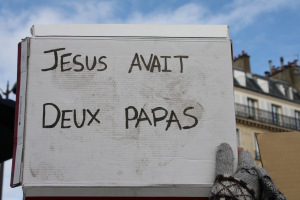Religion and Gay Marriage Opposition in France

This week, French President Francois Hollande signed into law legislation that allows for same sex marriage and child adoption by gay couples. With this act, France became the 14th country in the world recognizing these rights. Yet, the process has been all but plain sailing. Large-scale protests, parliamentary and societal polarization and extensive media coverage have gripped the country. On Tuesday, a French conservative and right-wing writer committed suicide in the Notre Dame church in Paris, after having written a last blog post in which he sharply criticized the gay marriage law and called for radical action. Today’s post by Eline Westra discusses the heated French debate from a religious perspective. It highlights the role of social conservatism and unconscious catholic beliefs in France, which seem to contradict the country’s well-known laïcité.
The gay rights issue was brought back on the political agenda when president Francois Hollande made it one of his key aims during the presidential elections in 2012 (1). When it arose as a concrete draft law in the Assembly at the end of last year, the topic entered the public debate even more. In January 2013 about 340.000 people organized themselves around the Eiffel Tower to show their opposition. In March they were approximately 300.000 people – among whom were also prominent members of parliament and conservative mayors. Even this week no-voices were widely heard, whereas the law had already been signed by the president and was approved by the constitutional court. Another big demonstration is planned on the 26th of May.
The Dutch journalist Peter Vermaas explains the strong popular involvement partly by pointing at ‘unconscious catholic beliefs’ present in modern-day France (2). Indeed, strong opposition to the law project comes from catholic and other religious groups. An interesting question therefore is : to what extent can religion be seen as a factor influencing the French protests? And, not unimportantly, in what way does that contradict with France’s active secularism known as laïcité?
Opposition from religious groups is widely seen and heard. For instance, the French humorist Frigide Barjot, one of the central spokesmen of the opposition movement ‘Manif pour Tous’, has portrayed herself as an active and committed Catholic. She supported the Pope in AIDS issues and organized other actions against intended reforms by Hollande that would be contrary to Catholic beliefs. “We are all born out of a woman and a man” and “A child needs a father and a mother” are the key sentences of the recent protests and directly relate to what is written in the Bible. Approximately 60-80% (3) of the French people identify with Catholicism and about 10% with Islam. Research shows that the stronger one believes in the fundamental truths of one’s religion, the more negative the evaluations of homosexual relative to heterosexual individuals become (4). These attitudes are essentially the same for fundamentalists from both Muslim and Christian backgrounds (5).
However, conclusions should not be drawn too rapidly. Most of the French Catholics do not actively practice their religion. By many it is seen rather as a cultural religion and a source of the French society’s traditions. This has created a more general conservative attitude which is often present in French society and which, although definitely related to Catholic tradition and culture, is only of indirect religious nature. A sociological analysis of the demonstrations shows the presence of conservative social groups that fear the loss of traditional family values, and feel by-passed by the fast pace of a progressive government. Among them are mostly middle class families, retired people, big Catholic families and inhabitants of the smaller countryside towns, although the presence of a great number of young people cannot be ignored..
A more direct – and crucial in a highly secular country like France – influence can be found in the determined activism from religious institutions. All three monotheist religions in France have publicly declared themselves to be against gay marriage and adoption: the Catholic Church, the chief rabbi of France and the Muslim Council. In a joint letter edited by the chief rabbi they openly opposed the law project and thus crossed the once so strict border between the private and the public sphere. Given that, according to the French laïcité principle, religious institutions are not allowed to intervene in public affairs, this is highly contradictory. The Catholic church in particular has been successful in organizing support against the law project. By giving anti gay marriage sermons and by urging ‘true Christians’ to join the opposition, it managed to unite a great number of people.
In sum, it seems that the active intervention by religious institutions in France contributed to a great extent to the organization of the opposition movement, that initially based its protests on more indirect religious beliefs. This ‘deep culture’ of Catholic conservatism was successfully reactivated and reformulated by the three monotheist religions, so that it could be witnessed at the surface again. By doing this, the laïcité principle, one of the characterizing foundations of the French Republic, has been severely challenged. The first gay marriages are expected this month still, but France as a country is more divorced than ever.
Eline Westra studies International Relations and International Organization at the University of Groningen. She is currently following the course Religion and the Public Domain at the university’s Honours College.
(1) Aim 26 of the Socialist Party’s election programme, http://www.parti-socialiste.fr/static/11069/les-30-propositions-le-4-pages-110384.pdf?issuusl=ignore.
(2) http://www.nrc.nl/nieuws/2013/04/12/franse-senaat-gaat-akkoord-met-homohuwelijk.
(3) 80% according to CIA Factbook, 60% according to a poll by the newspaper Le Monde in 2003.
(4) Rowatt, Wade C., et al. “Associations Between Religious Personality Dimensions and Implicit Homosexual Prejudice.” Journal for the Scientific Study of Religion 45, no.3 (September 2006) : 397–406. Accessed online, April 15th, 2013, https://bearspace.baylor.edu/Wade_Rowatt/www/articles/Rowatt_Tsang(2006)JSSR.pdf.
(5) Hunsberger, Bruce. “Religious Fundamentalism, Right-Wing Authoritarianism, and Hostility Toward Homosexuals in Non-Christian Religious Groups.” International Journal for the Psychology of Religion6, no. 1 (1996): 39-49. Accessed online, April 15th, 2013, http://www.tandfonline.com/doi/abs/10.1207/s15327582ijpr0601_5.

